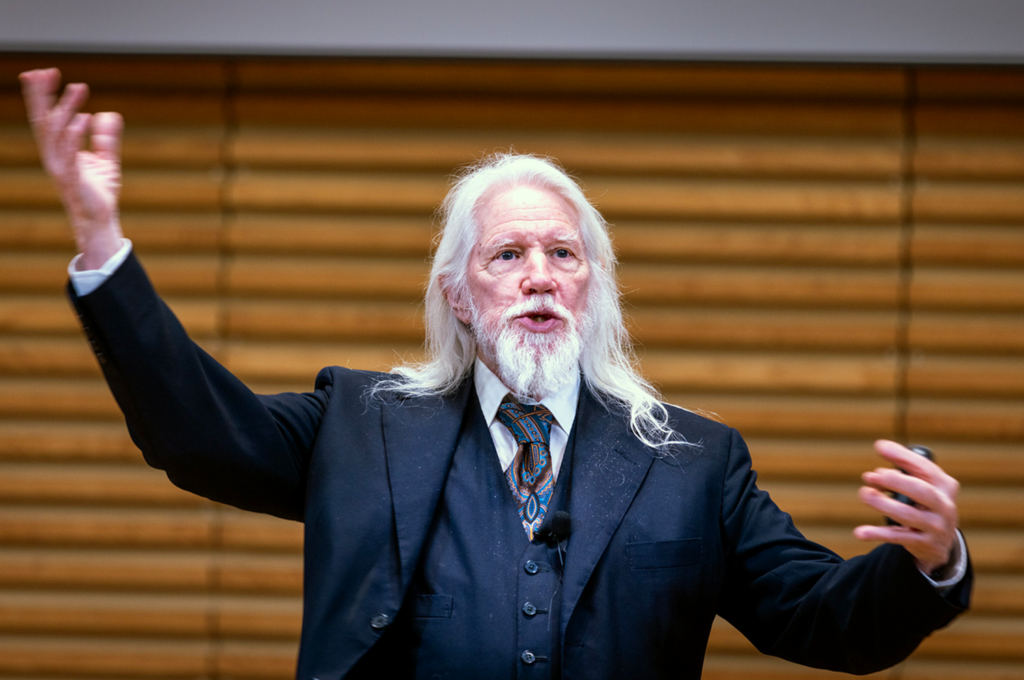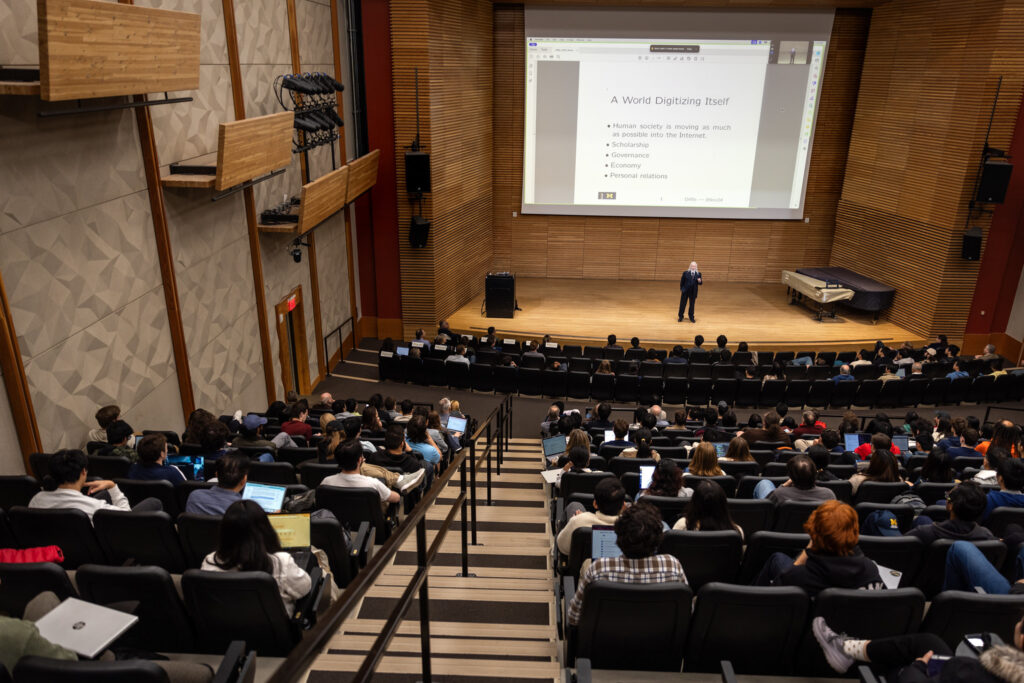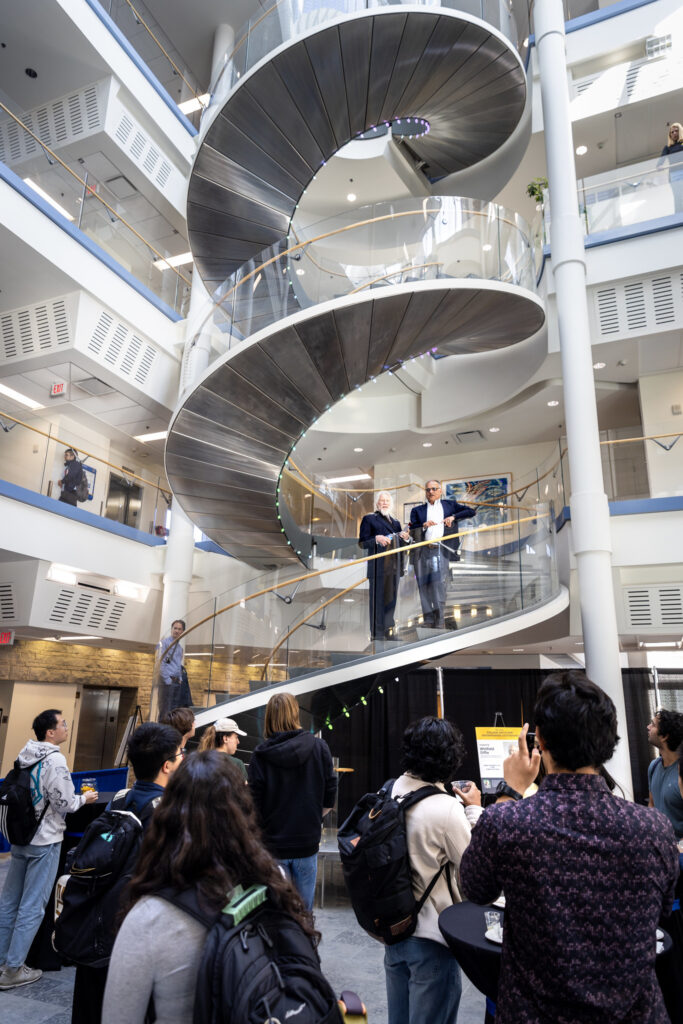University of Michigan hosts cryptography legend Whitfield Diffie

On Friday, November 8, the University of Michigan hosted one of the greats in the field of computer science. Over 300 community members gathered in Stamps Auditorium to hear Whitfield Diffie, famed for co-inventing the Diffie-Hellman cryptography protocol used across the internet today, as he delivered the 22nd William Gould Dow Distinguished Lecture titled “Post-Quantum Cryptography in Context.”
A veritable legend in the field, Diffie is best known for his development of the concept of public-key cryptography, which he developed jointly with Martin Hellman at Stanford University in the mid-1970s. The protocol they invented, known as the Diffie-Hellman key exchange, was the first to make practical implementation of public-key cryptography, a system that uses a pair of keys—one public and one private—to encrypt and decrypt data, allowing two parties to establish a shared secret over an insecure communication channel. This groundbreaking method laid the foundation for modern encryption techniques used in securing internet communications, protecting online transactions, and enabling privacy in digital communications.
In recognition of the lasting influence of this and other contributions, Diffie received the ACM Turing Award together with Hellman in 2015 for “ma[king] cryptography scalable to the Internet and revolutioniz[ing] the landscape of security.” Retired from positions as head of security for the Canadian telephone system and Sun Microsystems, Diffie is now an Honorary Fellow of Gonville and Caius College in Cambridge. He is a member of the National Academy of Engineering, the Royal Society, and NSA’s Cryptologic Hall of Honor.

Atul Prakash, Richard H. Orenstein Chair of Computer Science and Engineering at U-M, delivered opening remarks at the event, followed by an introduction of Diffie by Professor Ang Chen.
“Hosting a pioneer like Whitfield Diffie at the University of Michigan is an honor,” said Prakash. “His groundbreaking work in cryptography has fundamentally shaped current internet security protocols.”
In his talk, Diffie addressed the monumental shifts in cryptographic practices over the last century and warned of the forthcoming challenges posed by quantum computing. He gave an in-depth overview of the trajectory of modern cryptography, highlighting four major changes: the initial advent of encryption for secure communication, the development of public-key infrastructure, the integration of cryptographic protocols into daily internet security, and now, the impending transition to post-quantum cryptographic algorithms.

Diffie emphasized that the adoption of three new “post-quantum” cryptographic algorithms by the National Institute of Standards and Technology (NIST) is a significant milestone. These algorithms are designed to withstand potential threats posed by quantum computers, which could theoretically break existing cryptographic codes. To conclude his talk, Diffie challenged the audience to ponder when and what the next cryptographic revolution might be, provoking thoughtful consideration of the future trajectory of this evolving field.
The lecture was followed by a reception in Tishman Hall, located in the Bob and Betty Beyster Building, where attendees had the opportunity to engage with Diffie and further discuss the implications of his ideas. In all, Diffie’s visit to U-M provided invaluable insights and triggered thought-provoking discussions on the future of cryptography.
“Quantum computing has upset cryptography in the early 21st century, but it’s not as though we haven’t had this happen before,” said Diffie. ”We have had a significant upheaval in cryptography every 25 years since World War I. I am confident that we have the tools and knowledge at our disposal to deal with the current one and any future roadblocks to come.”
The Dow Distinguished Lectureship is the highest external honor bestowed by the Electrical Engineering and Computer Science (EECS) department at U-M. The lectureship was established by donations from students and friends of William Gould Dow, a former faculty member and chair of the department. Professor Dow was a noted scientist, educator, and inventor. During his 38 active years at Michigan from 1926 to 1964, he was largely responsible for creating and organizing at least 13 laboratories and research units, in addition to introducing a number of innovative areas of study into the curriculum.
 MENU
MENU 
